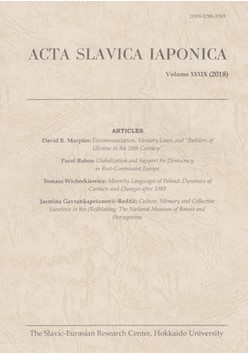The Younger Lenin and Statistical Thinking before the Revolution and during the Creation of TsSU and Gosplan
The Younger Lenin and Statistical Thinking before the Revolution and during the Creation of TsSU and Gosplan
Author(s): Stephen WheatcroftSubject(s): Agriculture, Economic history, Political history, Marxism, Government/Political systems, Political behavior, Comparative politics, 19th Century, Pre-WW I & WW I (1900 -1919), Interwar Period (1920 - 1939)
Published by: Slavic Research Center
Keywords: Lenin and the revolution; Russian Revolution of 1917; Lenin’s attitude to statistical thinkers; TsSU; Gosplan; First Commissars of Agriculture and Food;
Summary/Abstract: We no longer have the enthusiasm and respect for statistical thinking that was felt in the 19th Century when the smartest young brains across Europe were looking to Quetelet and his successors to explain how probability theory could be used to explain how social scientific laws could be applied to the history of large numbers of apparently independent agents. The enthusiasm that was felt by Prince Albert and his colleagues in Britain, as they promoted statistical congresses and statistical work in the mid 19th century was shared by many Russian intellectuals in the late 19th century and flowed with them into the early revolutionary period. In fact the enthusiasm of the Russian statisticians was part of the great Russian Revolution of 1917. Trotskii, who was not himself a statistical thinker, caught a glimpse of this feeling of enthusiasm in the young Lenin and his generation when he described them as seeing statistics as “the science of sciences” in a new world that would be dominated by science. Few other biographers have dwelt much on this aspect of revolutionary enthusiasm for statistical thinking of the times. It was an important factor in Lenin’s thinking until mid 1921, when faced with a series of economic, political and personal (health) crises Lenin appears to have changed his mind on these matters. It is the views of this later sick and old Lenin that were followed by Stalin and his successors, and it is the “sick” late Lenin’s views on statistics that have generally been accepted by his biographers as his views on statistics and statisticians.
Journal: Acta Slavica Iaponica
- Issue Year: 2020
- Issue No: 40
- Page Range: 65-84
- Page Count: 20
- Language: English

